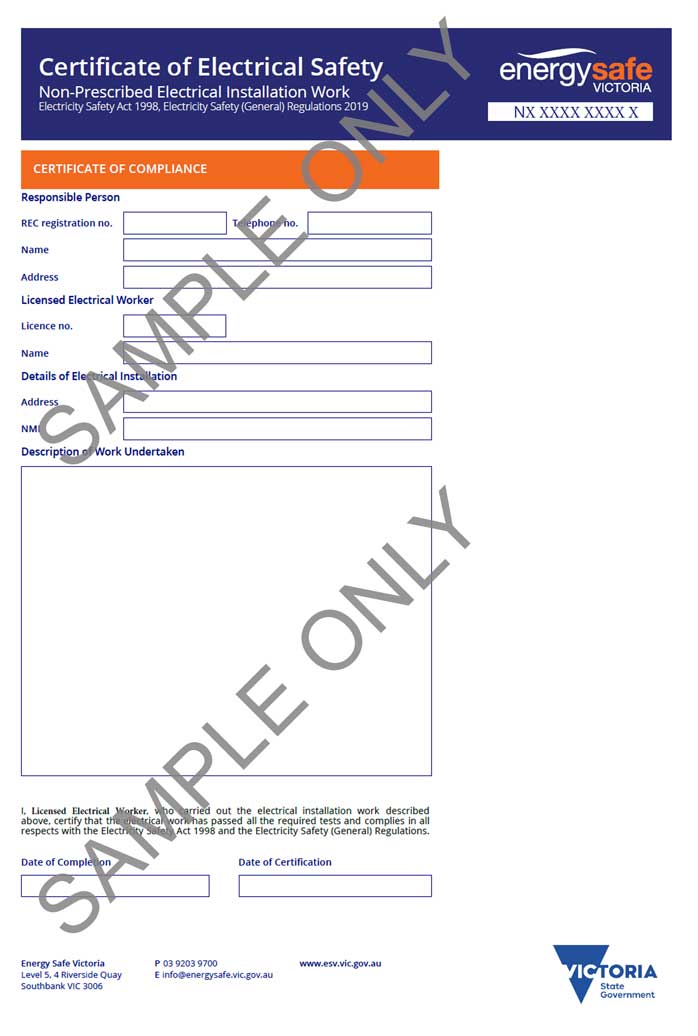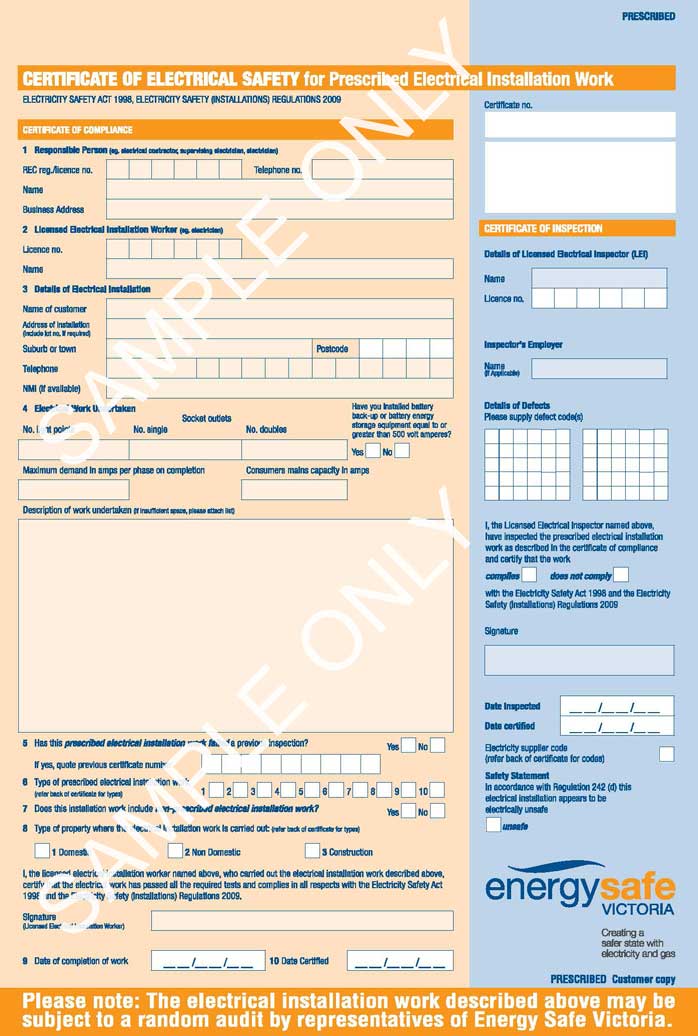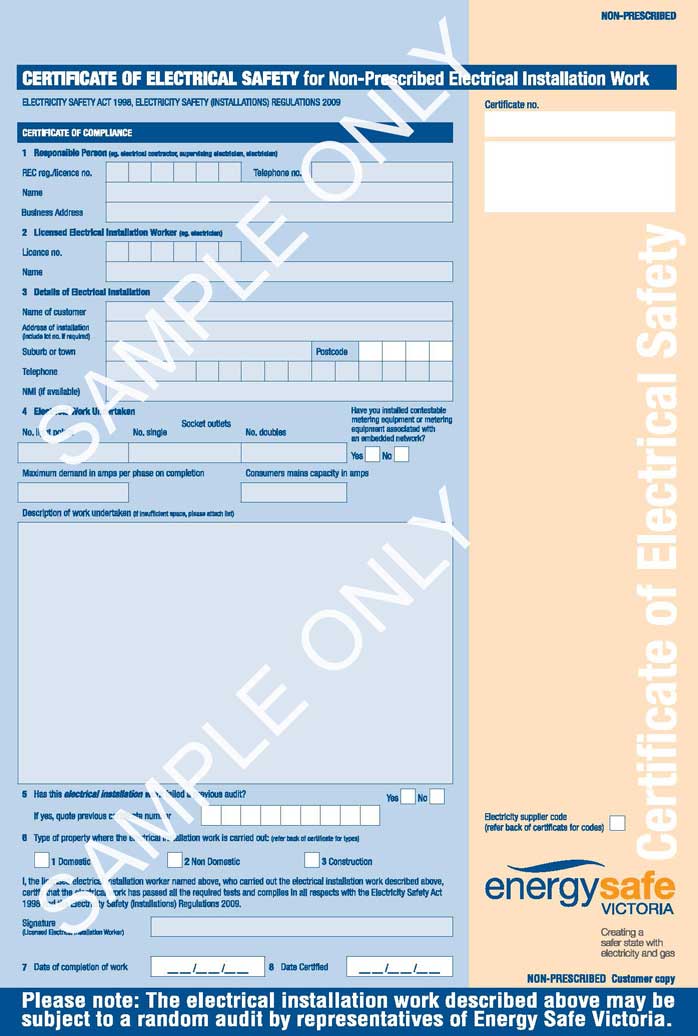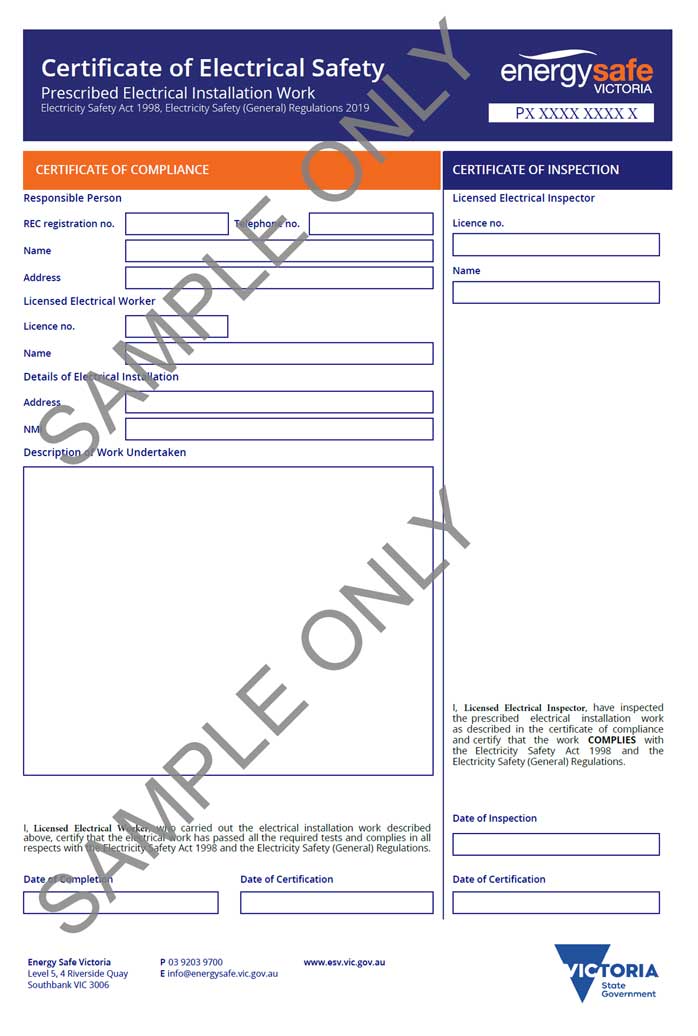Overview
For advice and information about the certificate of electrical safety, call the COES Information Line 1800 888 464
Some terms defined
- A Certificate of Electrical Safety (COES) – is a legal document issued by a Registered Electrical Contractor or licensed electrician to record the details of the electrical work they have performed. This is required by the Electricity Safety Act 1998 and the Electricity Safety (General) Regulations 2019
- Registered Electrical Contractor (REC) – in Victoria an electrician must work for a Registered Electrical Contractor to perform work for a customer. A Registered Electrical Contractor must be registered with Energy Safe Victoria.
- Licensed Electrical Workers (LEW) – in Victoria this includes electricians and Restricted Electrical Licence holders. All electrical workers must be licensed by Energy Safe to perform electrical work.
- Licensed Electrical Inspector (LEI) – in Victoria, prescribed electrical installation work must be inspected by an independent Licensed Electrical Inspector. Your REC must organise this inspection.
For all Certificates of Electrical Safety
These conditions apply to all COES:
- Registered Electrical Contractors (REC) and Licensed Electrical Workers (LEWs), such as electricians or Restricted Electrical licence holders, purchase and complete COES and provide a copy to their customer.
- Unregistered and unlicensed persons cannot purchase or lodge certificates with Energy Safe.
- The REC or LEW must provide a copy of the certificate to:
- the customer (the person or company that directly engaged the REC or electrician to perform the electrical work)
- Energy Safe
- other parties as required by the type of electrical installation work completed.
- If someone has engaged the Registered Electrical Contractor on your behalf (such as a rental provider, estate agent or builder), you may request a copy from the customer or from Energy Safe.
- Work listed on a COES may be audited by Energy Safe to verify that electrical installation work is safe and compliant.
- If your Registered Electrical Contractor or Licensed Electrical Worker refuses to arrange an inspection for prescribed electrical work or to provide a COES for electrical installation work completed at your property, and you are the customer, please report a safety issue or non-compliance to Energy Safe.
- Failure to follow the COES requirements is a criminal offence. A Registered Electrical Contractor or Licensed Electrical Worker that fails to comply may be subject to disciplinary action which could result in infringements or in severe cases, the suspension or cancellation of their licence.
Types of COES
There are two types of certificates – prescribed and non-prescribed.
Prescribed COES
'Prescribed' certificates are for electrical installation work that requires inspection by a Licensed Electrical inspector. This includes (but is not limited to):
- Consumer mains cables, main switchboard, meter box and main earthing system for your installation.
- Consumer mains cables, main switchboard, and main earthing system for your tenancy (multiple occupancy).
- Motor generator installation.
- Renewable energy generation systems, for example solar systems (solar photovoltaic generation system), or battery energy storage system.
The electrician must complete the electrical installation work and test prior to certification.
- An inspection will be undertaken by an independent Licensed Electrical Inspector. Your REC or electrician will organise this.
- Check that the inspector who signs the ‘Certificate of Inspection’ field on the COES has attended your property to conduct the inspection.
- Prescribed electrical installation work cannot be turned on or left turned on until it has been inspected.
- Inspection of electrical installation work should be completed within 8 business days of completion of the work. If the inspection of your electrical work is not completed within 8 business days, you should contact the Registered Electrical Contractor or electrician for help.
- Licensed Electrical Inspectors (LEIs) are not employees of Energy Safe. Energy Safe does not arrange or schedule inspections for prescribed electrical work.
- The Registered Electrical Contractor or electrician must provide the customer with a copy within 4 days of completion of the certificate once inspection is complete.
Non-prescribed COES
For electrical installation work performed within your electrical installation including but not limited to lights, power points, air conditioning, hot water service etc.
COES for non-prescribed work:
- The Licensed Electrical Worker must complete the electrical installation work and test before certification.
- Non-prescribed electrical installation work is energised (left turned on) once completed.
- An electrical inspection is not required.
- The Registered Electrical Contractor or Licensed Electrical Worker will complete the COES and is required to provide you with a copy within 30 days.
COES forms
This image gallery shows the various COES forms.
Use the arrow keys ( < and > ) to advance through the images, and click the double arrow to enlarge the gallery.
Requesting a copy of a COES
You can perform a search to identify if an online COES has been generated for electrical work completed at your property. This search includes electronic COES raised from July 2019 and will provide you with a COES number only.
If you need a copy of an electronic COES or require Energy Safe to conduct a search for certificate copies, please complete the COES search application form (linked below). This search is provided by Energy Safe at no fee.
If you have not received a COES and are unable to contact the original electrical worker and are either
- the owner or occupant of a property
- the customer (the person or entity that has engaged the electrician)
- an authorised Agent
complete and return the COES search application form to Energy Safe and we will conduct a COES search.
Along with your completed form, provide verification documentation detailing your name and the search property address, as evidence you are an interested person with a legitimate relationship to the property. To validate yourself as an ‘interested person’ with a legitimate relationship to the property, you must attach a copy of either:
- a council rates
- utilities notice
- another equivalent document, such as the front and back of your Victorian driver’s licence showing your name and the search property address.
If you are an authorised Agent, you must also attach evidence of this authorisation.
If you are the customer of the electrician, but are not the owner or occupant, please provide a copy of the invoice for the work or other evidence of the contractual relationship between you and the electrician.
Download the application form
Return your completed form and supporting documentation:
Email: coes@energysafe.vic.gov.au
Post:
Energy Safe Victoria
COES Search Application form
PO Box 262
Collins Street West VIC 8007
It may take up to 5 business days to process an application, not including any additional time required to obtain a copy from the Registered Electrical Contractor or Licensed Electrical Worker via the complaints process.
Additionally, the Act only requires a Licensed Electrical Worker (LEW) or Registered Electrical Contractor to retain a copy of a COES for three years. Energy Safe will not actively pursue anything beyond this period.
Note: A Certificate of Electrical Safety search does not search for safety reports completed for rental properties as per the Residential Tenancies Regulations 2021.
Please see our page on Residential tenancy changes for more information.
Other people may request a COES
Anyone else may request a copy of a COES by lodging a Freedom Of Information (FOI) request.
If you are unable to obtain your COES
If electrical work has been completed within the last three years and a Certificate of Electrical Safety has not been issued, you may lodge a complaint for Energy Safe to take action.
A Registered Electrical Contractor or Licensed Electrical Worker cannot refuse to issue a COES for any reason including payment issues or contract disputes.
Obtaining a COES is not always possible, even when a person is entitled to a copy.
If you need a COES for completed electrical work and Energy Safe is unable to provide a copy or identify the original Registered Electrical Contractor or Licensed Electrical Worker, consider getting another Registered Electrical Contractor or Licensed Electrical Worker to check and test the electrical work and ask them to provide a COES for that work.
You may find a Registered Electrical Contractor in your area by checking:
- our public search register
- your local trades directory
- community advertising or a web search.
Note: For safety checks completed on rental properties as per the Residential Tenancies Regulations 2021, an Energy Safe COES is not the correct form to be used for electrical checks. However, a COES must be issued if any electrical repair or maintenance work is carried out.
Please see our page on Residential tenancy changes for more information.
Charging customers fees for COES
Can RECs and RELs charge an administration fee for the purchase of COES?
Yes. A Registered Electrical Contractor (REC) or a Restricted Electrical Licence holder (REL) may charge their customers fees for the administration of Certificates of Electrical Safety (COES).
See COES fees
Energy Safe advises the following:
A Registered Electrical Contractor or Restricted Electrical Licence holder can seek payment from their customers for the purchase amount of COES. The authorised purchase amounts for COES is legislated in the Electricity Safety Act s45B(12) and Regulation 265 of the Electricity Safety (General) Regulations 2019. This amount is GST exempt.
However, a Registered Electrical Contractor or Restricted Electrical Licence holder may choose to charge their customers an additional handling fee for their time in purchasing the COES, filling it out and lodging it with Energy Safe as required. This additional fee amount is determined by the Registered Electrical Contractor or Restricted Electrical Licence holder and should be explained by these entities to you as their customer.
Some Registered Electrical Contractors or Restricted Electrical Licence holders elect not to separately list COES fees on their invoices, instead the Certificate of Electrical Safety and administration fee form part of the various items or may be included as part of one lump sum in their invoice.
Although the purchase of a COES from Energy Safe does not attract GST, a Registered Electrical Contractor or Restricted Electrical Licence holder may be required to add GST to the amount they charge their customers. Energy Safe cannot give advice regarding GST.
The amount the Registered Electrical Contractor or Restricted Electrical Licence holder charges the customer for the COES, including handling fee, is a contractual issue between the Registered Electrical Contractor or Restricted Electrical Licence holder and the customer.
If a customer believes they have been over-charged for this, the customer should contact Consumer Affairs Victoria for help.
Audits of electrical installation work
Work completed under a COES may be audited by Energy Safe to verify that electrical installation work is safe and compliant.
Auditors may make an appointment, visit your premises and ask to view and test the electrical installation work as described on the COES. This service is free and you may refuse an audit at any time.
Auditors must produce their Energy Safe Auditor ID cards when introducing themselves and will leave a copy of the brochure ‘Safety audit of electrical work’.
You can read more about our Certificate of Electrical Safety Audit program
Search a public register
A directory of tradespeople for industry and community use.
Further information
For advice and information about the certificates, contact the COES Information Line on 1800 888 464
Date: 14/04/2025 13:02
Controlled document
The currency and accuracy of this document cannot be guaranteed once printed or saved to a storage device. If in doubt, please check the ESV website for the current version.
Reviewed



